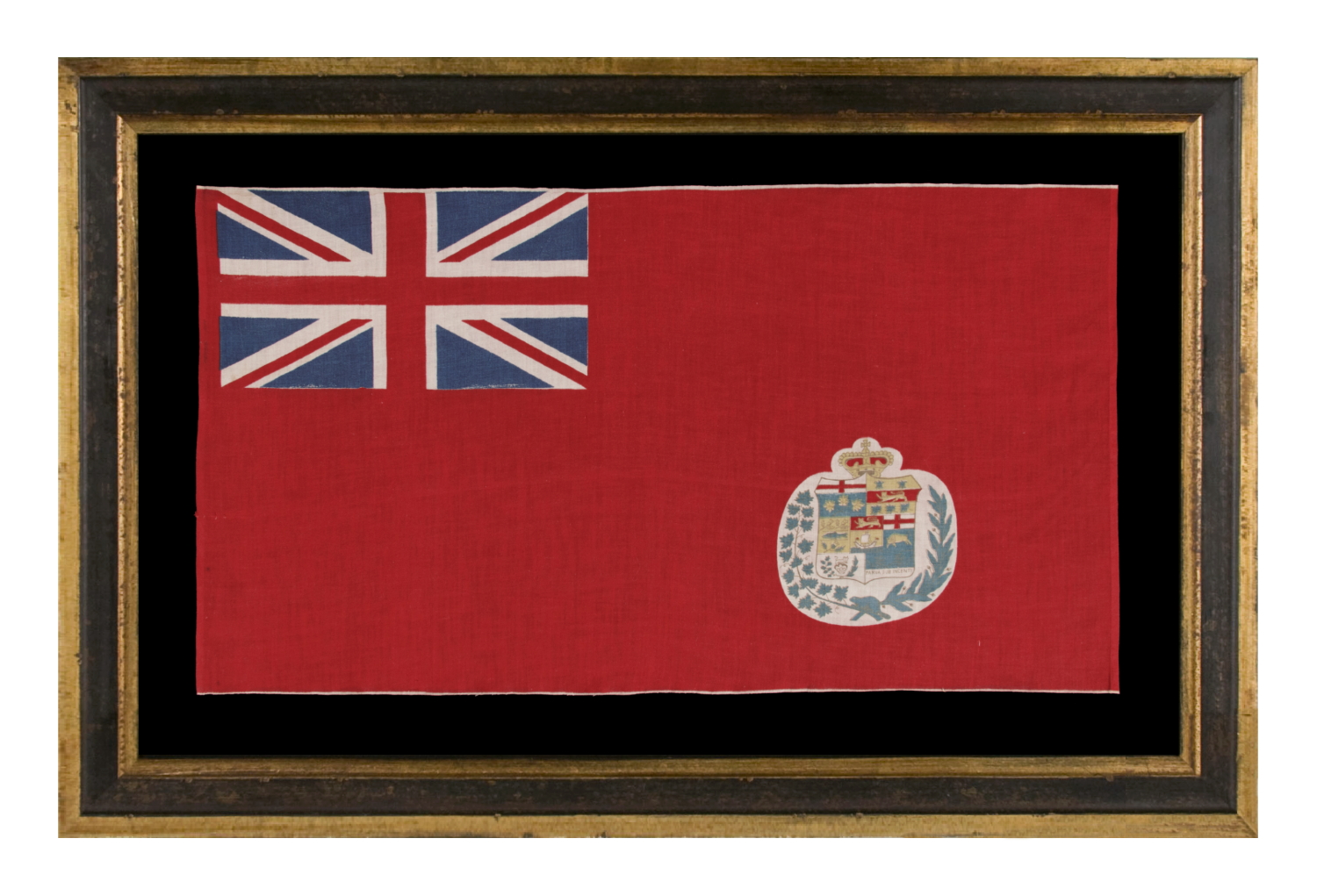
| |
CANADIAN NATIONAL FLAG WITH A COMPOSITE SHIELD THAT FEATURES 7 PROVINCES, circa 1873-1905 |
|
| Available: |
Sold |
| Frame Size (H x L): |
Approx. 26" x 39" |
| Flag Size (H x L): |
15.75" x 29" |
|
| Description....: |
|
Canadian national parade flag, printed on cotton bunting, in the design used between 1873 and 1905. This was one of the earliest versions of the basic design flown in Canada, following the Canadian Confederation of 1867. In that year, the British Red Ensign was unofficially adopted and modified, applying a crest, in the red field, that consisted of the arms of the four British colonies of Quebec, Ontario, New Brunswick and Nova Scotia, surrounded by a ring of maple leaves.
The Canadian Red Ensign changed over time. As each respective province was added, the emblem of that province was—at least theoretically—added to the device. While the Northwest Territories were added in 1870, no emblem signified them until 1957. Seven provincial badges appear that on this particular flag. These are as follows, starting at the top, going right-to-left:
Top Register: Ontario (1867) & Quebec (1867)
Middle Register: Nova Scotia (1867), New Brunswick (1867), & Manitoba (1870)
Bottom Register: British Columbia (1871) & Prince Edward Island (1873)
Because the device, formally referred to as the "composite shield," excludes Saskatchewan (1905) and Alberta (1905), the flag pre-dates their addition. After 1905, as many as nine provincial badges could be seen on the Canadian Red Ensign, which had been officially approved by the British Admiralty in 1892, for use at sea.
The open wreath sometimes included just oak leaves, at other times just laurel leaves, and at others a combination of both, as appears on this particular flag. In or around 1873-74, a beaver was added below the shield, at the point where the branches typically cross, and the device was set upon a white roundel (in this case, tracing the line of the shield, instead of being round).
The composite shield was replaced with the coat of arms of Canada upon its grant in 1921. In 1924, an Order in Council approved its use for Canadian government buildings abroad. Various changes were proposed afterwards, but a Canadian national flag was not officially adopted until Queen Elizabeth II (of Canada) proclaimed the present maple leaf design. That took place on January 28th, 1965, followed by an official inauguration on February 15th of that year.
Mounting: The flag has been hand-stitched to a background of 100% cotton twill, black in color, that was washed to reduce excess dye. An acid-free agent was added to the wash to further set the dye and the fabric was heat-treated for the same purpose. The mount was then placed in a black-painted, hand-gilded and distressed Italian molding. The glazing is U.V. protective plexiglass.
Condition: There are no significant condition issues. |
|
|
|
| Collector Level: |
Intermediate-Level Collectors and Special Gifts |
|
| Flag Type: |
Parade flag |
|
| Star Count: |
|
|
| Earliest Date of Origin: |
1873 |
|
| Latest Date of Origin: |
1905 |
|
| State/Affiliation: |
Other |
|
| War Association: |
|
|
| Price: |
SOLD |
|
| |
Views: 2561 |
|
|
|

